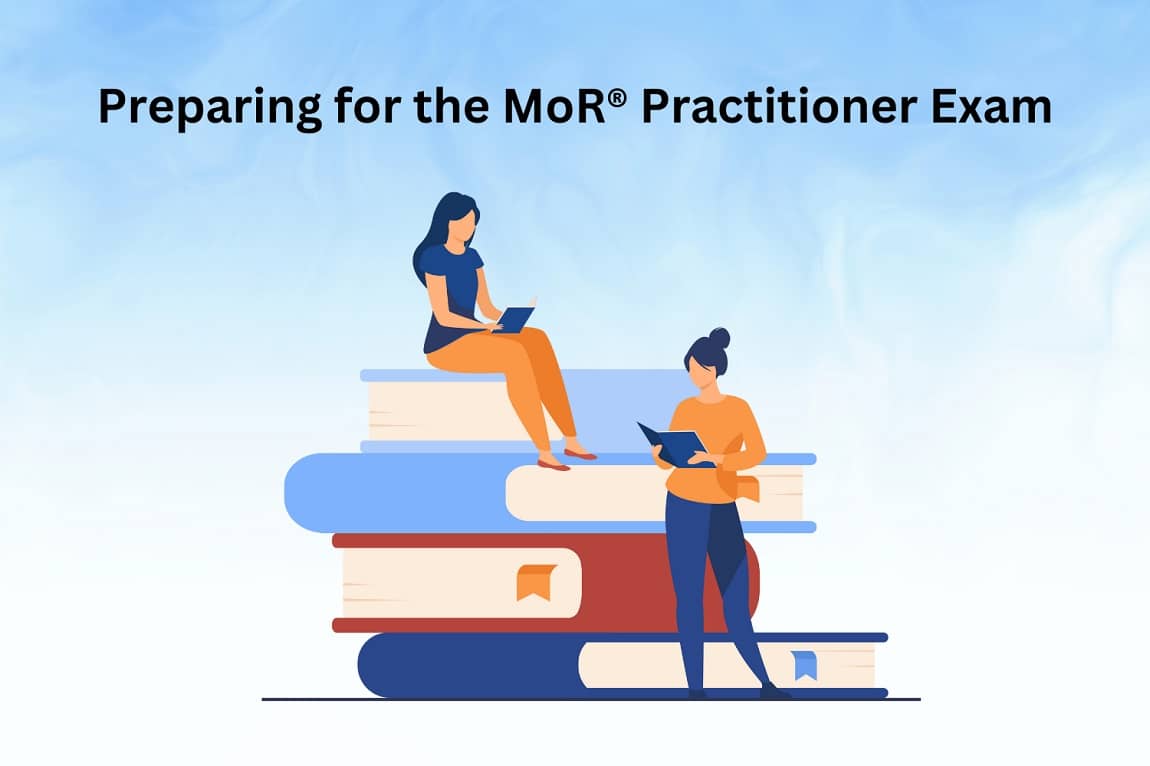The Management of Risk (MoR®) Practitioner certification is an essential credential for professionals who are ready to demonstrate their risk management skills within their organisation. When you join MoR Training and prepare for the certification exam, you must effectively use preparation strategies. This blog will discuss strategies and tips for MoR exam preparation.
Table Of Contents
- Understand the MoR® Practitioner Exam Format
- Review MoR® Practitioner Syllabus and Study Materials
- Utilise Practice Exams and Mock Tests
- Create a Study Plan and Timetable
- Participate in Active Learning and Hands-On Practice
- Ask Guidance from Experienced Professionals
- Focus on Exam Techniques and Time Management
- Practice Effective Revision and Exam Day Preparation
- Conclusion
Understand the MoR® Practitioner Exam Format
It’s essential to know how the MoR® Practitioner test format before you start studying. Most of the exam questions are based on real-life risk management situations. These questions are testing your ability to use MoR® concepts, processes, and techniques. Multiple-choice questions and case studies are included in the exam. Real life situations can also be provided, asking you to think critically and solve problems.
Review MoR® Practitioner Syllabus and Study Materials
To prepare, read the MoR® Practitioner syllabus and study tools carefully. These can be found in official MoR® resources or accredited training providers. Understand the main ideas, principles, and methods in the exam syllabus. The essential concepts include:
- Risk management principles
- Risk appetite and tolerance
- Risk analysis techniques
- Risk reaction strategies
- Risk management and business
Use study materials provided by the training institute or download them from the official website. Mark important topics and concepts in the syllabus.
Utilise Practice Exams and Mock Tests
Mock tests and practice exams are great ways to see how much you are ready for the MoR® Practitioner exam. Use practice tests available on different websites. Training institutes often conduct practice exams, allowing members to familiarise themselves with the test’s style and format. Mock tests can practice types of questions and time limits. It helps to identify the areas you need improvement. Look at how you did on practice tests to see what you did well and what you could do better.
Create a Study Plan and Timetable
Make a structured study plan and schedule to help you stay on track with your planning. Separate the MoR® Practitioner course outline into doable chunks and set aside specific times to study each. Set reasonable learning goals, review essential ideas again, and take practice tests. To be consistent and avoid burnout, ensure your study plan works with your work and personal obligations.
Participate in Active Learning and Hands-On Practice
To pass the MoR® Practitioner exam, you must do more than just read study tools. You can actively learn by using MoR® concepts and techniques in real-life situations. To better understand things and figure out how to solve problems, take part in workshops, case studies, and group talks. Using MoR® models and tools, practise finding risks, evaluating them, analysing them, and planning how to respond to them.
Ask Guidance from Experienced Professionals
Get help and advice from certified trainers or MoR® professionals with extensive experience. They can provide helpful information, tips, and advice on studying for the test. To gain valuable information and learn from real-life examples, join study groups, webinars, and workshops run by professionals in your field. Use networking opportunities to contact your peers and share study materials and test-taking methods.
Focus on Exam Techniques and Time Management
To do well on the MoR® Practitioner test, you should study the material and focus on exam techniques and time management strategies. Carefully read each question, think about the situation, and pick out the most important details before choosing an answer. Make good use of your time by giving each question and part of the test enough time. If you have time, you can come back to hard questions later.
Practice Effective Revision and Exam Day Preparation
As the test date approaches, allot time to study and prepare. You can read over your notes, flashcards, and summaries. This helps you remember important ideas and concepts. Ensure you have carried your ID and exam admission tickets on the test day.
Conclusion
To pass the MoR® Practitioner test, you need to prepare well. There are different exam strategies that you can use while preparing for the exam.



